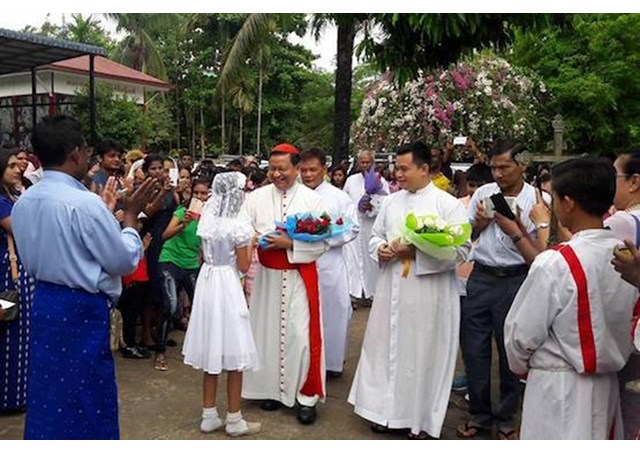
Myanmar’s Card. Bo reminds religious leaders about their role in dialogue, peace

Myanmar’s prominent Catholic Church leader on Wednesday reminded his counterparts from other faiths about their moral obligation to build peace and harmony at the grassroots levels in the strife-torn nation. Speaking at an interreligious peace conference in Yangon, Cardinal Charles Bo told leaders from Buddhism, Christianity, Islam and Hinduism, that the wish for peace needs to shine through every word and deed, and solutions must be found through "dialogue and mutual understanding." The cardinal who is Archbishop of Yangon, stressed the importance of the Panglong conference which seeks to bring together the country's diverse ethnic groups to discuss how to end conflict and negotiate a permanent solution. "Peace and harmony at the grassroots level will help all the future Panglong peace conferences. Religious people have a role in dialogue and peacemaking," Cardinal Bo said in his keynote speech April 26 while addressing some 200 participants, including delegates from civil society sectors. Organized by the Catholic church, the two-day conference has as its theme, "The role of religions in building a nation of peace and development: Peace is possible, peace is the only way."
Speaking to UCANEWS, Cardinal Bo stressed the crucial role all religious leaders have in bringing peace to the country that has been bedeviled by war for almost 70 years. "We religious leaders are not interfering in politics and it is the duty of all religious leaders to create peace," he said. "The government must officially request faith leaders to contribute to peace building."
In an opening speech to the gathering Union minister for Religion and Culture, Aung Ko said that it is the right time for all stakeholders to work for peace as the country transitions to democracy. "I appeal to all religious leaders to try and discuss suggestions and feedback from this conference which will be sent to the second Panglong peace conference that begins on May 24," Aung Ko said.
Currently, peace remains elusive in Myanmar as sporadic fighting continues in Kachin and northern Shan states where ethnic factions have refused to put down their arms, a prerequisite required for attending the first Panglong peace conference in August 2016. The meeting was the first in a series of peace effort dubbed the “21st Century Panglong Conference”, invoking the 1947 Panglong Agreement between major ethnic organizations and Aung San, the independence hero and father of Aung San Suu Kyi who was assassinated shortly thereafter.
More than 100,000 people in the Christian-majority Kachin State have been displaced since 2011 when a ceasefire between the military and the Kachin Independence Army broke down after 17 years. Ashin Seindita, founder of the Asia Light Foundation, said the government needs to appreciate the role religious leaders can play in spreading peace. "From the national level to district and township levels across the country, the government needs to organize interfaith groups so that these groups can help to curb religious violence and promote peace," U Seindita told ucanews.com. Soe Nay Oo, a Muslim leader from Myoma mosque in Sagaing, near Mandalay city, explained to UCANEWS that religious leaders are important factors of peace if they can avoid extremism. "We really need to give the message of peace to people at the grassroots level beyond this conference as many people struggle with their daily survival and can't concentrate on peace. So all religious leaders must preach peace to their followers," Soe Nay Oo added. (Source: UCAN)
| All the contents on this site are copyrighted ©. |


